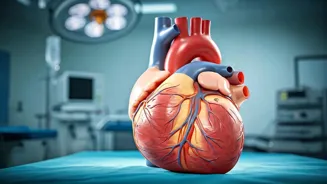Heart Failure Explained
Heart failure is a serious condition that occurs when the heart cannot pump enough blood to meet the body's needs. It’s not the same as a heart attack,
although a heart attack can lead to heart failure. The condition can manifest in various ways, making it essential to understand the different types and their underlying causes. There are several types of heart failure, including heart failure with reduced ejection fraction (HFrEF) and heart failure with preserved ejection fraction (HFpEF). Each type has distinct characteristics and requires specific approaches to treatment. Causes of heart failure can range from coronary artery disease and high blood pressure to problems with the heart valves and congenital heart defects. Recognizing these causes is the first step in prevention and management. The symptoms include shortness of breath, fatigue, and swelling in the legs and ankles. These symptoms can worsen with activity and are often accompanied by other signs like rapid heartbeat and persistent coughing or wheezing. Early diagnosis and treatment are vital for better outcomes. Medical professionals employ various diagnostic tools, such as blood tests, electrocardiograms (ECGs), and echocardiograms. The treatment strategies typically involve lifestyle changes, medications, and, in severe cases, surgical interventions. Regular check-ups, a healthy diet, and an active lifestyle can significantly improve the quality of life for those living with heart failure.
Atypical Symptoms Unveiled
An atypical heart attack presents symptoms that differ from the classic signs of a heart attack. While the typical presentation involves intense chest pain, these variations can include less obvious indicators that may be easily overlooked. These less apparent signs often lead to delays in seeking medical attention, which can have grave consequences. Symptoms can vary widely among individuals, but some frequently reported atypical symptoms include pain in the upper abdomen, discomfort in the back, jaw, or arms, and shortness of breath without chest pain. In women, atypical symptoms of a heart attack may include nausea, vomiting, and fatigue. These differences highlight the importance of being aware of the variety of ways a heart attack can manifest. The recognition of atypical symptoms necessitates a prompt medical evaluation. Delaying treatment increases the risk of heart damage and other complications. It's essential to seek immediate medical help when experiencing any unusual or concerning symptoms, especially if you have risk factors for heart disease. These factors can include a family history of heart disease, high blood pressure, high cholesterol, diabetes, smoking, and a sedentary lifestyle. Early diagnosis and treatment are critical for minimizing damage and improving chances of recovery. Medical professionals use ECGs, blood tests, and other imaging techniques to accurately diagnose the condition. Standard treatments involve medications, such as aspirin and beta-blockers, and in some cases, procedures like angioplasty or bypass surgery. It's vital to understand that every second counts during a heart attack. Immediate medical intervention can significantly improve a person's survival chances and long-term health.
Prevention and Care
Taking care of your heart involves implementing proactive measures to minimize risks and maintain overall cardiovascular health. Prevention is key, and adopting healthy lifestyle habits can dramatically reduce the chances of heart problems. Regular exercise is one of the most impactful preventative strategies. Aim for at least 150 minutes of moderate-intensity exercise, or 75 minutes of vigorous-intensity exercise, each week. This can involve activities like brisk walking, jogging, swimming, or cycling. A balanced diet, rich in fruits, vegetables, and lean proteins, is also crucial. Limit your intake of saturated and trans fats, cholesterol, and sodium, which can all contribute to heart disease. Managing conditions like high blood pressure, high cholesterol, and diabetes is essential. Regular check-ups with a doctor allow for early detection and management of these conditions. Avoiding smoking and excessive alcohol consumption is another important step. Smoking damages blood vessels and increases the risk of heart attack and stroke. Excessive alcohol consumption can raise blood pressure and contribute to heart failure. Regular medical check-ups are crucial for monitoring heart health and catching any potential issues early. During these visits, doctors can check blood pressure, cholesterol levels, and other vital health markers. Adhering to medication schedules and following medical advice is also necessary. When a heart condition is diagnosed, it's vital to work closely with healthcare professionals to develop a personalized care plan. By prioritizing heart health through preventive measures and prompt medical attention, individuals can significantly enhance their quality of life and reduce the likelihood of facing serious cardiovascular complications.












